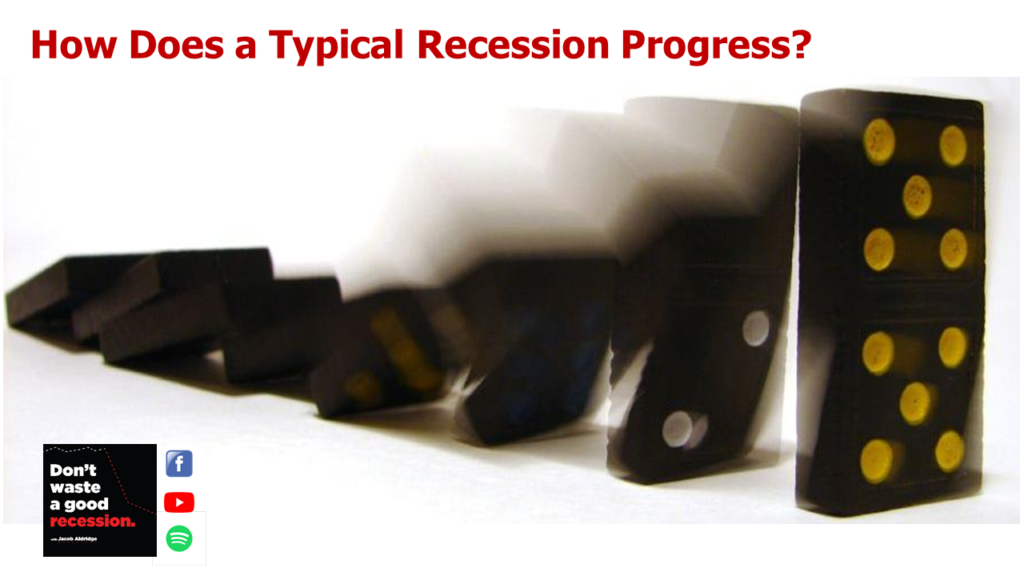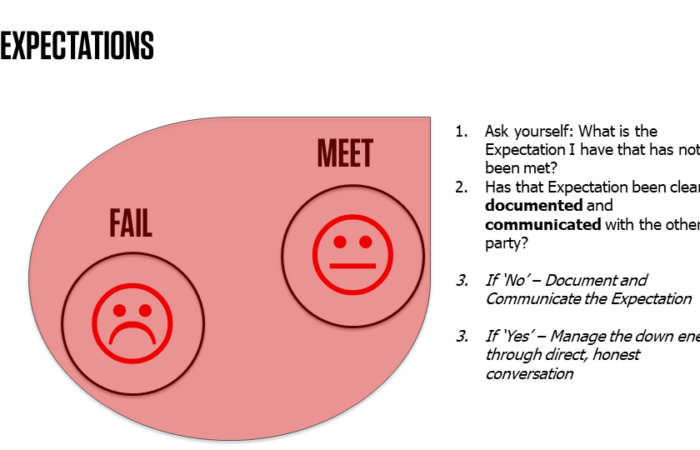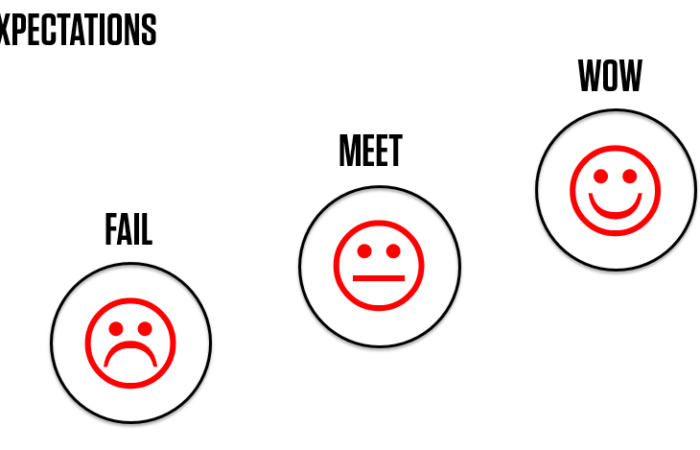Good Recession Presentation #9 15.05.2020
Since this week’s final feature-length presentation ended up also being our longest yet, I am presenting it here in sections.
- How does a Typical Recession Progress?
- How is the Coronavirus Recession Different?
- What does that mean in practice for your Business?
- Plus, as always, our Weekly Economic Snapshot and Welcome Meditation
This is the ninth of our regular, standalone, pandemic recession videos. If you have 86 minutes to invest, I recommend watching the whole presentation on YouTube by clicking here.
How does a Typical Recession Progress?
Typically, a Recession begins and expands as a series of dominoes fall. A downturn or failures in Sector X lead to Bank / Finance / Liquidity restrictions, which then flows through to Suppliers and the local Community in that Sector.
While these crises can happen in any sector at any time, they only turn into a full-blown Recession when the fourth domino falls: what was localised spreads into the Tertiary Network, followed by Negative Multiplier Effects (like rising Unemployment), before suddenly “We’re All in this Together”.
Why – when Recessions happen in a cyclical manner – are economists so terrible at predicting exactly how and when they will occur? Watch the video for an analogy involving a very fast sports car, but the simple answer is this: when a wider economy is overheated, it doesn’t take much for Sector X to spread into Tertiary Networks … it’s just, like knowing the exact reason a speeding car will crash, it’s hard to know which Sector will be ‘X’ this time around.
After all – I was preparing my advisory clients from late 2018 for this Recession; but I could never have predicted a Pandemic would be the trigger.
Does your business have an advisor with Recession experience? From Strategy Days to my Client for Life club, I help business owners of every size who want the courage to live a truly outrageous life (in any economy) . Let’s Chat.
How is the Coronavirus Recession Different?
Now that you know how a Recession typically progresses, you can ask “How is the Coronavirus Recession Different … and what does that mean for my Business?”
Watch the video above for the important details about why and how this recession is faster, bigger, and longer than usual. How it will be a Supply-Side Recession for most of the world, which confirms the L-Shape Recession forecast I have been making from the beginning.
There are also a number of ‘Known Unknowns’ in the Coronavirus Recession – after all, it’s a f@&$ing Pandemic! Perhaps you have the answers to some of my questions, to give your business a competitive edge moving forward?
Lastly, we end this video with an even broader Macroeconomic look at why this Recession was inevitable, predictable … and will ultimately register as an economic ‘blip’ in the middle of a 20 year expansion period.
Pessimism know means missing years worth of wealth and freedom on the other side.
Downloads & Subscriptions
If you own a business with 2-500 employees, join our mailing list for every presentation and exclusive offers here.
Join our discussion group at https://www.facebook.com/groups/GoodRecession
Full Webinars and specific chapters, including all our weekly updates, are available on our YouTube Channel. Please Like and Subscribe here, or search “Don’t Waste a Good Recession”.
Audio versions of our webinars are released as a Podcast on Spotify, Apple Podcasts, and Captivate. Search for “Don’t Waste a Good Recession with Jacob Aldridge”, and you can Subscribe to be notified of each new episode.
Questions and Next Steps?
Not sure how to fully apply these lessons to your business? My contact details – for any questions, feedback, or to start a conversation about whether I can support you and your team directly – are below.






[…] How many people are actually going to go to work in many industries where they feel that they are at risk of contracting this deadly disease? Because again, even if they’re allowed to go to work, if they don’t then that will have an impact perhaps on them financially but on the Supply Side of the economy and as we saw last week when we talked about how the coronavirus recession is different to a typical recession that lack of Supply one of the key things that means that this will be a deep and protracted recessi…. […]
[…] not going to belabour that point as I’ve already done several videos and the economic updates and on the “Don’t Waste a Good Recession” YouTube channel about why this will be an […]
[…] I’m not a permabear. While I’ve been preparing my clients for this recession since late 2018 (and congratulations to two of them who have just had record months for both revenue and profit) I do feel that this point in the cycle is just a blip. We are currently in the middle, painful part of a longer 20-year bull run that’s going to cont…. […]
[…] us back to new highs. My projections are still the second half of 2021, and that we’re having an L-Shaped recession. So outside of “technically”, the recession is going to […]